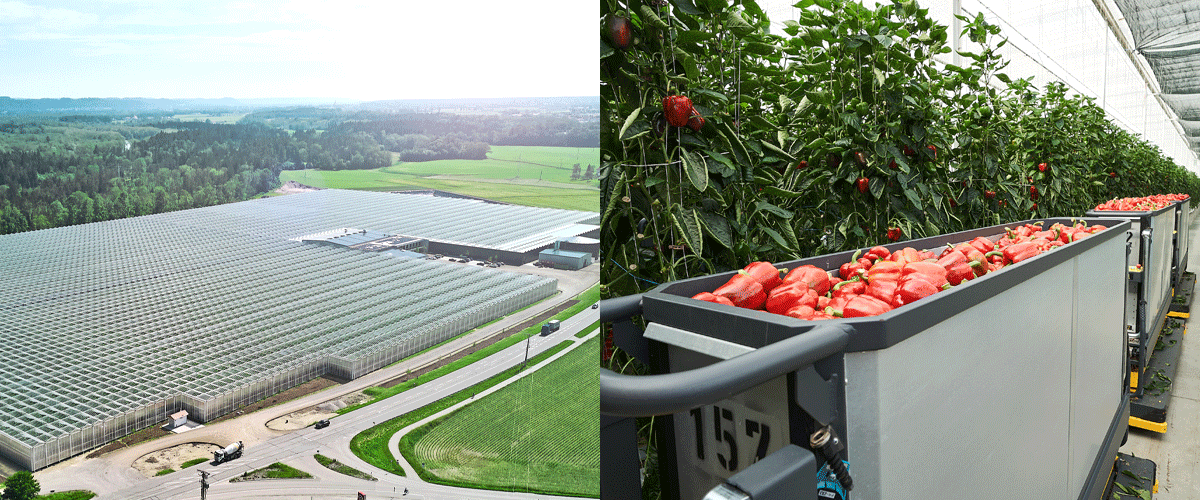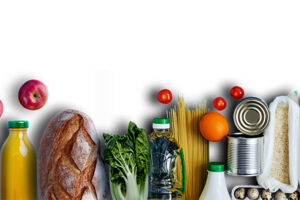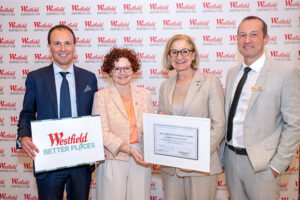Whether it’s energy, the climate or global supply chains – the current situation has created entirely new challenges. Kaufland is therefore increasingly focused on sourcing fruit and vegetables from Germany all year-round. Together with the Reichenspurner family, Kaufland is opening one of Germany’s most modern and sustainable greenhouses in Chiemgau. Here, strawberries, tomatoes and peppers are grown and harvested year-round on an area the size of 22 soccer fields. The electricity and heat required for this is already partly covered by renewable energy and in the near future will be covered almost exclusively so.
Throughout the year, a wide variety of tomato varieties such as vine tomatoes, beef tomatoes, cocktail vine tomatoes, cherry vine tomatoes, mini vine tomatoes and mini plum vine tomatoes are grown and harvested for Kaufland. Furthermore, sweet peppers are grown between March and November. In addition to spring and late summer, the new greenhouse also supplies Kaufland stores with strawberries from Bavaria between October and December.
“The greenhouse, also allows us to offer tomatoes, peppers and strawberries from Germany with a particularly aromatic taste and exceptional freshness during the winter months,” says Stefan Lukes, Head of Purchasing for Fruit and Vegetables at Kaufland. “By growing them in Germany, we save time and reduce transportation distances, which has a very positive effect on keeping the product fresh. The vegetables are transported from the field to our stores much faster, usually in less than 24 hours.” A representative Kaufland study recently showed that many Germans also like to eat peppers or tomatoes in winter. It is important to more than half of Germans (55.4 percent) that the vegetables are grown year-round in Germany.
“By growing fruit and vegetables regionally, we are making ourselves a bit less dependent on the current challenges in global supply chains, and in doing so we are also supporting local fruit and vegetable growers,” says Lukes. After all, sustainable transformation and supporting domestic agriculture and regional products are key concerns at Kaufland.
Bees and ladybirds are important employees in the greenhouse
On peak days, up to 30 tonnes of tomatoes, 15 tonnes of peppers and up to six tons of strawberries are harvested and delivered fresh to Kaufland stores throughout Germany within a few hours thanks to sophisticated logistics and short transport routes. For the best possible freshness and quality, the care and harvesting work is done by hand. A doctor of entomology and her scouting team check the plants daily for pests. These are specifically targeted with beneficial insects such as predatory bugs, ichneumon wasps and ladybirds. Bumblebees and bees from a local apiary are used to ensure optimal pollination of the plants.
Sustainable energy supply through sun and geothermal energy
“Our focus is on resource-efficient and climate-friendly production. In the future, we will be able to cover all heating requirements from our own geothermal plant,” explains Thomas Reichenspurner from Reichenspurner Hof. There is a photovoltaic system on the roof. The electricity produced there is used entirely in the greenhouse. “Combined heat and power generation enable us to produce the electricity needed to light the winter tomatoes, and recover the resulting heat that would otherwise be lost, to heat the greenhouse. A large part of the CO2 produced in the process is also needed for plant growth and is thus absorbed by the plants. We therefore make the best possible use of the energy employed,” says Reichenspurner.
Irrigation is carried out exclusively with rainwater. This is harvested from rooftop surfaces in a nearly 50,000 cubic meter storage container next to the greenhouse. In the immediate vicinity, there are around 30 hectares of wild flower meadows which provide habitats and refuge for insects, birds and small animals. This area also acts as a natural CO2 reservoir.
For a diverse selection of fresh fruit and vegetables produced throughout the year in Germany, Kaufland works with a large network of regional and national farmers who also produce organic and biodynamic fruit and vegetables. In Kaufland’s fruit and vegetable section, customers can find more than 200 fruit and vegetable items grown in Germany throughout the year.






